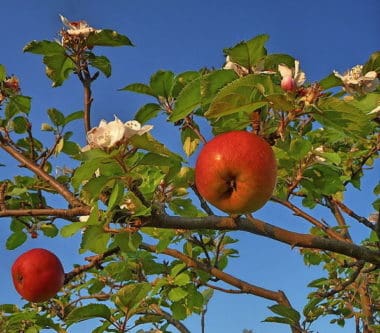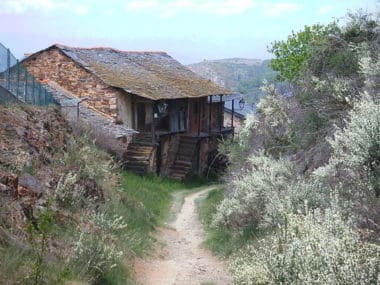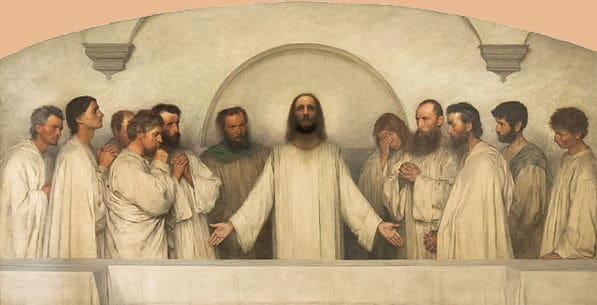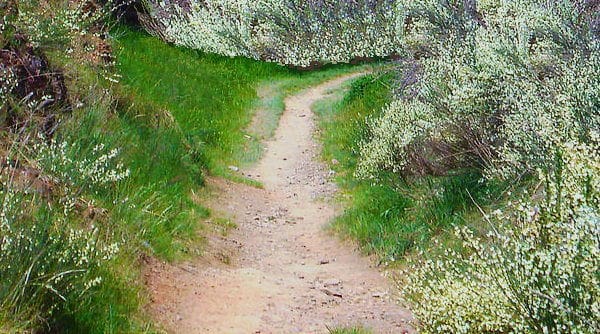What Path is God Calling Me To?
Dear Father John, How do I know what path of life God is calling me to?
WHEN AN APPLE tree is mature, when its roots are firmly, deeply grounded in good soil with plenty of water, when its trunk is strong and healthy and protected by sturdy bark, when its branches are smooth and supple and covered with wide green leaves that drink in the sunlight, it blossoms and bears fruit. Its potential is being realized. It has grown in accordance with its nature and is glorifying God, reflecting a small ray of God’s own goodness and beauty by being all that it was created to be. The innate powers of the tree are flourishing together harmoniously.
 All the innate powers of the human person are enlisted by the Lord in his command to love God with “all your heart, with all your soul, with all your mind, and with all your strength” (Mark 12:30). When each of these powers is harmoniously integrated into the ongoing pursuit of greater union with God, which is the purpose of our existence, our potential is being realized, we are glorifying God, and the fruits of the Spirit are blossoming, ripening, and enriching our lives and the lives of those around us: “The fruit of the Spirit is love, joy, peace, patience, kindness, generosity, faithfulness, gentleness, self-control” (Galatians 5:22–23). Those fruits of the Spirit have no limits. The more we are united to God, the more intense and abundant they become, as Jesus pointed out, and as we have previously noted: “I came so that they might have life and have it more abundantly” (John 10:10).
All the innate powers of the human person are enlisted by the Lord in his command to love God with “all your heart, with all your soul, with all your mind, and with all your strength” (Mark 12:30). When each of these powers is harmoniously integrated into the ongoing pursuit of greater union with God, which is the purpose of our existence, our potential is being realized, we are glorifying God, and the fruits of the Spirit are blossoming, ripening, and enriching our lives and the lives of those around us: “The fruit of the Spirit is love, joy, peace, patience, kindness, generosity, faithfulness, gentleness, self-control” (Galatians 5:22–23). Those fruits of the Spirit have no limits. The more we are united to God, the more intense and abundant they become, as Jesus pointed out, and as we have previously noted: “I came so that they might have life and have it more abundantly” (John 10:10).
Growing in Virtue
Forming these powers so that they are directed in a healthy way, toward the truth and goodness that are in accordance with our nature and our calling, is what the Christian spiritual tradition calls growing in virtue. The virtuous person, from this long-standing perspective, is the one who is most alive, the one whose soul is most mature. Growing in virtue sets the human person free to be all that we were created to be, just as the healthy apple tree, when all its powers reach maturity, is free to fulfill its inherent potential.
 Growing in virtue, then, is the same thing as growing in happiness. Just as an apple tree remains frustrated (ontologically, not consciously) if the soil or other conditions inhibit its roots and branches and leaves from growing to maturity, so human beings remain frustrated and unhappy when their hearts haven’t discovered and desired to pursue their proper goal, when their intellects aren’t being nourished on the eternal truths, when their wills aren’t engaged in authentically meaningful and creative activity, and when their passions aren’t enjoying docility to the spirit.
Growing in virtue, then, is the same thing as growing in happiness. Just as an apple tree remains frustrated (ontologically, not consciously) if the soil or other conditions inhibit its roots and branches and leaves from growing to maturity, so human beings remain frustrated and unhappy when their hearts haven’t discovered and desired to pursue their proper goal, when their intellects aren’t being nourished on the eternal truths, when their wills aren’t engaged in authentically meaningful and creative activity, and when their passions aren’t enjoying docility to the spirit.
Only when we are on the path of learning to love God with all our heart, soul, mind, and strength—only when we are on the path of growing in virtue—do we experience the vitality, the hopefulness, the keen satisfaction that enables mature Christians to say such shocking things as St. Paul did:
[But] whatever gains I had, these I have come to consider a loss because of Christ. More than that, I even consider everything as a loss because of the supreme good of knowing Christ Jesus my Lord. For his sake I have accepted the loss of all things and I consider them so much rubbish, that I may gain Christ. (Philippians 3:7–8)
As we move forward along the path of deeper union with God, the path of growing in virtue, our experience of the fulfillment that only God can give increases and intensifies, gradually obliterating all idols.
A Progressive Journey
Here on earth, we never reach the limit of that experience. Rather, God continues to present us with situations in which, if we so desire, our virtue can continue to grow and expand, thereby continuing to intensify our experience of keen inner vitality and clarity. We remain pilgrims, moving along  through time and space toward our final destination in heaven, as long as we remain residents of earth. As Christian pilgrims in the world, we are “aliens and sojourners” (1 Peter 2:11), because “…here we have no lasting city, but we seek the one that is to come” (Hebrews 13:14). Yet every step of love that leads us closer to the eternal city also increases our union with God, matures our virtue, and enhances our vitality. No one is more alive than a saint.
through time and space toward our final destination in heaven, as long as we remain residents of earth. As Christian pilgrims in the world, we are “aliens and sojourners” (1 Peter 2:11), because “…here we have no lasting city, but we seek the one that is to come” (Hebrews 13:14). Yet every step of love that leads us closer to the eternal city also increases our union with God, matures our virtue, and enhances our vitality. No one is more alive than a saint.
So even as the circumstances in which we live continue to be marked by the pain, sorrow, and brokenness of this fallen world, our interior experience as we navigate those circumstances takes on more and more the flavor of holiness. We begin to understand, better and better, the peace that Jesus bequeathed to us during the Last Supper—
 an inner, overflowing peace that differs from any satisfaction available from the goods of this passing world: “Peace I leave with you; my peace I give to you. Not as the world gives do I give it to you. Do not let your hearts be troubled or afraid” (John 14:27). As we grow in virtue, we begin to understand how St. Paul, who was never trite or superficial or overly optimistic, was able to command Christians to rejoice at all times:
an inner, overflowing peace that differs from any satisfaction available from the goods of this passing world: “Peace I leave with you; my peace I give to you. Not as the world gives do I give it to you. Do not let your hearts be troubled or afraid” (John 14:27). As we grow in virtue, we begin to understand how St. Paul, who was never trite or superficial or overly optimistic, was able to command Christians to rejoice at all times:
Rejoice in the Lord always. I shall say it again: rejoice! Your kindness should be known to all. The Lord is near. Have no anxiety at all, but in everything, by prayer and petition, with thanksgiving, make your requests known to God. Then the peace of God that surpasses all understanding will guard your hearts and minds in Christ Jesus. (Philippians 4:4–7)
The Operative Question
This is the path of life that God has called us to. And to follow this path is what we long for. We now know that loving God with our heart, soul, mind, and strength means engaging all the powers of our human nature in the great adventure of seeking first the kingdom of God. But what does it look like to actually do that? How do we go from our immature state of loving to a mature state of loving? We love God already with our heart, soul, mind, and strength—otherwise we wouldn’t have read this far. But what activities can we engage in to continue feeding the growth in virtue that will lead us to full maturity, to loving God with all our all? That is what [we will look at in the future].
Editor’s Note: This is another excerpt from Father John Bartunek’s new book “Seeking First the Kingdom” filled with “practical examples and down-to-earth wisdom which will show you how to bring Christ into each facet of your life”. Click here to learn more about the book…or if you wish to get it for a friend or relative who doesn’t read on line.


